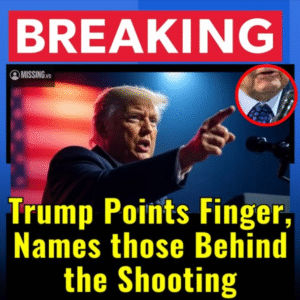Trump Exposes Names Tied to the Attack: Who Are They?
The assassination of Charlie Kirk on September 10, 2025, sent tremors through the American political landscape. Kirk, the 31-year-old founder of Turning Point USA, was shot in broad daylight while speaking at Utah Valley University. The moment was captured on video, the bullet striking him mid-sentence, and the footage spread across social media like wildfire. But as the nation mourned, President Donald Trump took to the airwaves with a chilling announcement: “With a high degree of certainty, we have him.”
The suspect, Trump revealed, had been turned in by someone close to him—a minister with ties to law enforcement. While the name of the shooter was not immediately released, Trump’s statement marked a turning point in the investigation. But it wasn’t just the shooter who drew attention. In the days that followed, other names surfaced—individuals accused not of pulling the trigger, but of glorifying the act, amplifying it, or mocking the victim.
Haley Kreidel: The Dispatcher Under Fire
One of the most controversial names to emerge was Haley Kreidel, a 911 emergency dispatcher in Nashville, Tennessee. Far-right commentator Laura Loomer “exposed” Kreidel for allegedly glorifying Kirk’s assassination on social media. According to Loomer, Kreidel posted a cartoon image depicting the moment Kirk was shot, complete with a bloodied neck wound and the caption “Debate This.” She also reportedly quoted Kirk’s own words about gun violence: “Yes, people die from gun violence. It’s tragic. But that’s the price of freedom. Unfortunately, it’s worth it to keep the Second Amendment intact”.
The backlash was swift. Kreidel was placed on unpaid administrative leave. Her social media accounts vanished. Her LinkedIn profile was scrubbed. Comedian Terence K. Williams joined the chorus, stating, “She should not be working for 911.”
Trump didn’t name Kreidel directly, but his allies did. Loomer’s post went viral, and the message was clear: those who celebrate political violence, even indirectly, will be held accountable.
Matthew Dowd: The Analyst Who Crossed a Line
Another name that surfaced was Matthew Dowd, a political analyst formerly with MSNBC. During live coverage of Kirk’s death, Dowd speculated about the “environment in which a shooting like this happens,” and suggested—without evidence—that it could have been a supporter “shooting their gun off in celebration”.
The comment was widely condemned. Dowd was fired from MSNBC within hours. Critics accused him of trivializing the assassination and fueling conspiracy theories. Trump’s allies pointed to Dowd’s remarks as emblematic of a media culture that dehumanizes conservative voices.
The Shooter: Still Unnamed, But Not Unknown
While Trump confirmed the suspect had been captured, authorities have yet to publicly release the name. What is known is that the shooter used a high-powered bolt-action rifle, fired from a rooftop, and fled into the woods. Over 7,000 tips poured in, and federal investigators released photos and video footage of the suspect.
Trump described the killer as someone “very close” to a minister who ultimately turned him in. The implication was clear: this wasn’t a random act. It was targeted. Political. Personal.
Utah’s governor called it a “political assassination.” Trump called Kirk a “martyr for truth and freedom.”
The Digital Battlefield
Beyond the physical attack, the assassination ignited a digital war. Social media platforms were flooded with tributes, conspiracy theories, and calls for justice. But they also became a breeding ground for glorification and mockery.
Accounts were suspended. Posts were deleted. Screenshots circulated. And names—like Kreidel and Dowd—became symbols of a deeper cultural divide.
Trump’s allies demanded accountability. “Debate time is over,” Loomer wrote. “The Left killed the one guy who was willing to still debate with kindness and grace”.
The Political Fallout
In Washington, the assassination triggered chaos. Speaker Mike Johnson held a moment of silence on the House floor. Rep. Lauren Boebert declared, “Silent prayers get silent results.” Shouting erupted. Accusations flew. The divide widened.
Security protocols were reviewed. Events were canceled. Public figures reconsidered their exposure. And Trump, never one to retreat, doubled down.
He promised a posthumous Presidential Medal of Freedom for Kirk. He called for unity—but also for vigilance. “We’re not just mourning,” he said. “We’re watching.”
The Names That Matter Most
While Kreidel and Dowd became lightning rods, the names that truly matter are the ones behind the scenes—the investigators, the whistleblowers, the family members who turned in someone they loved because they knew it was right.
Trump’s revelation that a minister helped identify the suspect speaks to a deeper truth: justice often begins with courage. With someone saying, “I know him. And I can’t stay silent.”
The Road Ahead
As the investigation continues, more names may surface. More stories may unfold. But one thing is certain: the assassination of Charlie Kirk has changed the landscape.
It’s no longer just about politics. It’s about principle.
And as Trump said, “With a high degree of certainty, we have him.” But the question remains: who else was involved? Who else knew? And who will be held accountable?


